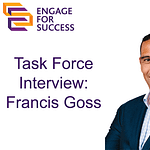Hear from Martyn Dicker, Director of People and Learning at The Prince’s Trust, member of the Engage for Success Task Force and chair of its Not for Profit Thought and Action Group.
Sarah: So, starting off with the basics, what does “Employee Engagement” mean to you?
Martyn: For me, employee engagement is more than just being aligned to what the organisation is trying to achieve, it’s about being fully engrossed in how it will go about it – really understanding the role you play. And balancing this with attention to personal needs and wellbeing.
Sarah: Thank you that’s a really clear definition. Can you tell me about an engaging manager you’ve had in your career?
Martyn: I’ve been fortunate to have worked with many engaging leaders. One particular CEO stands out for a few reasons:
- He set a clear vision that you felt you helped shape and deliver
- He communicated regularly and honestly, giving lots of updates
- He gave regular feedback, listened and challenged appropriately. He wanted your input and would build on what you said so that you got a real sense of co-creation
- He was empathetic and had strong values; he was genuine, they were a part of his DNA.
Sarah: How did his style and approach affect how you did your job?
Martyn: Well, I suppose if someone is keeping you informed and inspired, it rubs off on you…. I tried to replicate his approach with my own team. It made me really want to master my skillset and I was willing to go above and beyond for the organisation.
Sarah: And how has effectively engaging with employees helped you in your career?
Martyn: It has helped me considerably. It’s helped me to clarify and communicate a vision, to build a strong team, and set the right culture. These things have improved results in organisations where I’ve worked and in turn that has supported me in my career. It’s not why you do it of course but my personal “brand” and profile have also been enhanced. I’ve been offered non-executive positions and included in HR magazine’s most influential lists, and the work I’ve done around employee engagement was one of the reasons I was offered my current job.
Sarah: What is the most surprising thing you have learned about what makes for productive and happy employees in your career?
Martyn: It wouldn’t surprise me now but when I started out it did. You might have the best vision, smartest strategy, but just taking the time to say a genuine thank you can make an immense difference! Simple gestures which make people feel appreciated have a huge positive impact. Also it’s important to know your staff, and understand their individual preferences and how and when they like to be thanked.
It’s not always as straightforward as treating people how you would like to be treated – treat them in ways they value.
Sarah: That’s so true. Moving on to the Not for Profit toolkit, which of the practices in it do you think has the potential to make the biggest difference? Perhaps it’s hard to single out one?
Martyn: Actually it’s not. Our research into the four enablers of employee engagement showed that, only a miniscule 15% of respondents believed that their managers understood employee engagement. This compares to for example 60% believing their organisation had a strong strategic narration.
So focusing on the role of managers will create the biggest potential shift. It’s really important this happens in our sector because we found some very high scores that we determined had been conflated, because people were highly engaged with the mission – but not always with the organisation’s working practices.
Sarah: That makes sense, and focusing on the manager’s role chimes with a lot of other research findings. What can the private sector learn from great practice within the not-for-profit sector do you think?
Martyn: If you took the six main recommendations within our Toolkit and took “Not for Profit” off the title, it’s all pertinent. You can access and download the Not for Profit Toolkit – but in essence it’s about educating managers and leaders, focusing on the four enablers, measuring aspects of engagement accurately and ensuring that the actions arising from such surveys have impact.
Although not unique to us, the not for profit sector does have many great examples of leaders living the values. That’s something the private sector could draw inspiration from.
Sarah: What are the next priorities for the Not for Profit Thought and Action group?
Martyn: Having completed phase one, which looked at engagement “beyond the mission”, we are moving to phase two, understanding how we engage volunteers. For example, the 70,000 Games Makers of the 2012 London Olympics were a really uplifting success story. How were they engaged – what made it so successful? We want to take that kind of learning back into the world of employees. Our group will continue to meet every other month. We are still agreeing the outputs, but people have repeatedly told us how much they value case studies so it’s likely they will be a core component.
Sarah: And if people would like to get involved, and share learning?
Martyn: They can contact me or group coordinator Siobhan Renshaw by emailing info@engageforsuccess.org
Written and interview conducted by:
Sarah Cooper, Regional Ambassador for Engage for Success in Bristol and Bath and Virtual Content Team Volunteer
LinkedIn: http://uk.linkedin.com/in/sarahacooper
Would you like to interview one of our Taskforce and join our Virtual Content Team? Email sian@engageforsuccess.org to find out more!




